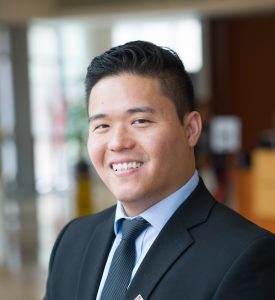Why did you choose USC School of Pharmacy?

I chose to attend this school because I had a vision to work with the underserved. I knew that School of Pharmacy has Dr. Steven Chen, who has done phenomenal work with safety net clinics. I took a shot and approached Dr. Chen as a first year student telling him about my ideas and experiences. He was willing to listen and, long story short, I am now implementing an idea I had through the Albert Schweitzer Fellowship because of Dr. Chen’s mentorship. This is just one example of how the faculty members here at USC have helped me.
The opportunities are endless here at USC if you are willing to take advantage of them, so I highly recommend the School of Pharmacy!
What is one of the best experiences you’ve had at the school so far?
One of the best experiences I have had at the school thus far was an opportunity given to me by Dr. Cynthia Lieu, Director of Introductory Pharmacy Practice Experience Programs. With her support I was given the opportunity to create my own IPPE elective this fall semester, where I could receive school credit for an experience that I truly wanted.
Naturally, my interest in opioid abuse and my belief that pharmacists could play an integral role in substance abuse led me to create an IPPE where I would incorporate Clinical Pharmacy services into opioid abuse management at a community pharmacy setting. To accomplish this goal, I would have to establish a collaborative practice agreement with local substance abuse/pain management programs for them to allow a pharmacy to provide comprehensive medication management services in addition to outpatient opioid withdrawal management.
Thus far, I have gained valuable experience in protocol writing for naloxone and have done a lot of research on how to best market clinical pharmacy services for the collaborative practice agreements that I seek. Overall, this experience has been invaluable to my development as a student pharmacist and I am grateful for the opportunity that USC Mann has given me.
What are your plans after graduation?
Ideally, I would like to expand on the idea of the safety net clinics that Dr. Steven Chen created and own and operate an independent pharmacy that provides clinical services for the underserved. I envision a community pharmacy that has a MD/DO who serves as a primary care provider who is in collaborative practice agreement with the pharmacist to provide clinical services.
This is my ultimate career goal and I fully understand that it will take some time. After graduation I will pursue a residency that will further enhance my clinical skills in order to accomplish my ultimate career goal.
What is the learning environment like at USC School of Pharmacy?
Very supportive and innovative! Unlike your classic undergrad experience where it is cutthroat and competitive, USC School of Pharmacy actually promotes collaboration and encourages team-based learning. The curriculum is tailored towards the students to gain the most out of their education. For example, Pharmaceutics, taught by amazing PhD professors Dr. Ian Haworth and Dr. Rebecca Romero, is probably the most innovative class I have ever taken. They take normal didactic lectures to the next level by giving students the opportunity to apply the knowledge they learn in case group projects. It is a well thought out course that I have not experienced anywhere else.
You are an Albert Schweitzer fellow. Why is the service you do important to you?
First and foremost, I am not the only Albert Schweitzer Fellow at the school this year and must give credit to my partner in the project, Heesoo Kim!
As Albert Schweitzer Fellows, we are addressing the issue of homelessness in Los Angeles by working with John Wesley Community Health (JWCH) in Skid Row. We are implementing a “Advocate Care” program to the JWCH student-run mobile clinics to address the issue of follow up rates from pathways shelter to the Center for Community Health. The intent of the advocate care program is to increase follow up rates and provide basic case management for patients to hopefully improve their health and social outcomes.
What we generally do as advocates is keep patients on top of their health and social goals through motivational interviewing and rapport building. This project is the most important project that I am a part of because it is what I am truly passionate about: helping the homeless. I have gained so many valuable experiences and skills through the Albert Schweitzer Fellowship thus far and am grateful to be of service to the homeless community.

